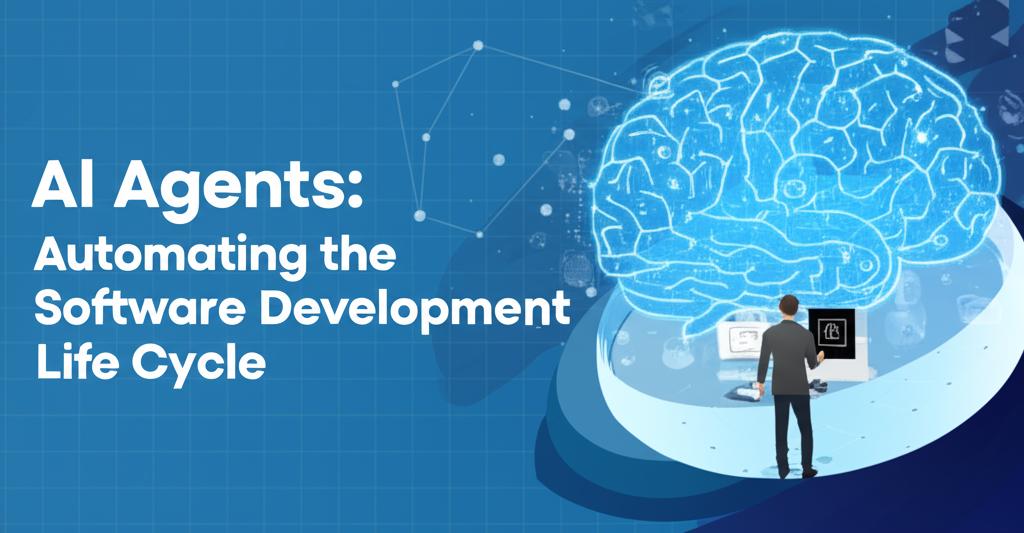The landscape of software development is undergoing a significant transformation, driven by the rapid advancements and integration of Artificial Intelligence (AI) Agents. These intelligent systems are moving beyond simple automation to become active participants in nearly every phase of the Software Development Life Cycle (SDLC).
AI agents are increasingly capable of understanding context, making decisions, and performing tasks autonomously, effectively acting as intelligent partners to human developers. This evolution is leading to a new era of "agentic AI," where these agents serve as force multipliers, enhancing speed, efficiency, and code quality throughout the development process.
Impact Across the SDLC:AI agents are making their mark on all stages of software development:
- Requirement Analysis: AI can analyze user feedback, market trends, and project data to help define clearer and more validated requirements. Natural Language Processing (NLP) tools assist in translating stakeholder conversations into structured documentation.
- Design and Architecture: AI agents can assist in simulating interface designs, optimizing user experience (UX) flows, and even suggesting architectural improvements based on best practices, scalability needs, and maintenance considerations. Some tools can even validate prototypes.
- Coding and Development: This is where AI agents have perhaps seen the most prominent adoption. AI-powered coding assistants can generate code snippets, complete complex code segments, refactor existing code for efficiency, and even help in creating entire application prototypes from textual descriptions. They can also assist in real-time bug detection and suggest fixes.
- Testing and Quality Assurance: AI is revolutionizing software testing by automating the generation of comprehensive test cases, predicting potential failure points, and ensuring continuous integration pipelines run smoothly. AI can also identify and address bugs autonomously.
- Deployment and Maintenance: AI agents can automate deployment processes, monitor application performance in real-time, and even predict potential issues before they impact users. They can also assist in managing updates and security patches, streamlining the entire maintenance workflow.
The integration of AI agents offers numerous benefits, including accelerated timelines, reduced errors, and increased developer focus on high-value tasks such as complex problem-solving, system architecture, and innovation. Developers are finding that AI agents can handle repetitive and mundane coding tasks, freeing them up for more strategic and creative work. This shift is leading to a redefinition of developer productivity, moving away from lines of code written towards the overall impact and value delivered.
The role of the developer is evolving from a pure coder to an "AI architect" or an orchestrator of AI tools. This necessitates upskilling and a focus on understanding how to effectively collaborate with and guide these intelligent agents. Low-code and no-code platforms, often enhanced by AI, are also democratizing development, allowing a broader range of individuals to participate in creating applications.
Current Trends and Future Outlook:The trend is towards more context-aware and proactive AI assistants. AI agents are becoming increasingly capable of understanding the entire codebase and its surrounding context, anticipating developer needs, and even collaborating with other AI agents on complex tasks. Multi-agent systems, where specialized agents work in concert, are emerging as a significant advancement.
Open-source AI technologies continue to improve, offering more cost-effective solutions. Platform engineering is also being revolutionized by AI, with tools that can codify training, policies, and identify areas for improvement.
Challenges to Consider:Despite the immense potential, the adoption of AI agents in the SDLC is not without its challenges. These include:
- Trust and Reliability: Building trust in the consistency and accuracy of AI-generated code and decisions is crucial.
- Security and Privacy: Ensuring that AI agents do not introduce security vulnerabilities or compromise sensitive data is paramount.
- Integration Complexity: Seamlessly integrating AI agents into existing development stacks and workflows can be complex.
- Cost: The compute power and expertise required for fine-tuning and maintaining sophisticated AI agents can be a factor.
- Ethical Risks: Addressing potential biases in AI decision-making and ensuring clear audit trails are important ethical considerations.
- Upskilling and Change Management: Teams need to adapt to new ways of working and acquire new skills to leverage AI agents effectively.
Organizations that strategically invest in AI agents, address these challenges, and foster a collaborative environment between human developers and AI are poised to gain a significant competitive advantage. The continued evolution of AI agents promises to further reshape the software development landscape, leading to faster innovation, higher quality software, and a more dynamic and impactful role for developers.

